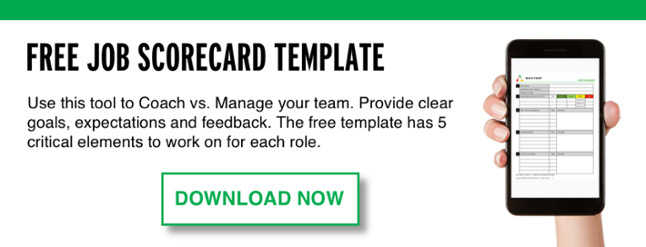How do you know if your company is set up for great execution? Most people would say that they want an environment that allows and encourages execution. What does that look like? Does your current work environment encourage execution or does it inadvertently slow down your execution?
Here is what it does not look like:
1) When you hear: “That’s not my job” or "I can’t help you with that, because that’s not my![]() current role. If our manager gave me that role, then I can help you with that…”
current role. If our manager gave me that role, then I can help you with that…”
2) When managers feel afraid to be accountable, take on the full responsibility of both success as well as failure.
3) When we hold back brutal facts during project debriefs because we are concerned about hurting other people’s feelings. Then, we will only hold each other accountable when it is convenient. And it is almost never convenient to share honest or brutal facts.
4) When we don’t slow down and take the time to make sure our teams understand what success looks like. Begin with the end in mind, as Stephen Covey used to say.
Here is how each of the above puts a ceiling on your execution. (That’s a nice way of saying how they cause you to have poor execution.)
That’s not my job.
I hear this quite often when I visit companies. It is evidence that there are silos built up or that roles have not yet been well defined. People might not feel safe venturing outside of their roles. This slows you down and allows balls to be dropped inadvertently, especially when balls are being passed from one department to another. Most executives I know get frustrated and angry when they hear an employee say “… but that’s not my job.” Anger, while justified, does not help. In fact, anger often makes the situation worse. Here are a couple of tips to consider:
- Provide extreme clarity on what each person’s role is. Share what are the top 1-3 results you are expecting the person to deliver. (Refer to previous blog and People Job Scorecard Tool)
- Encourage people to learn more about other departments. In your planning sessions, get people to sit with different department members and work on opportunities and problems together. This will help you to build cross functional teamwork and break down silos.
- Encourage the response you want. When you hear “that’s not my job,” instead of being annoyed or angry, ask more questions that help the person see the connections between their direct role and the ball that just dropped. The right questions will help lead the person to understand how it is indirectly their job and what a difference they can make if they took action.
Managers deflecting accountability.
This might also be evidence that work is not defined in a way that accountability is clear. If managers are afraid of being held accountable to getting things done, then how can they hold their team members accountable to getting things done well? Lack of accountability makes it very difficult to make adjustments when things are not going well. You might find out too late that something is not working well.
- What’s the root cause? Why are managers afraid? Do we have a culture that punishes so much that managers are afraid to take on clear responsibilities and be accountable for clear and published results?
- Try focusing on solving problems that bubble up from not being accountable and solving these problems as a team instead of focusing on why the person was not able to get it done.
- Educate that being accountable to clear results allows us to take preventive action earlier versus later, allowing us all to be more successful together. After all, the true enemy is outside the four walls of our company, not inside!
Weak post-project debriefs.
Debriefs are weak and a waste of time if we are afraid to share what can be improved for fear of hurting someone’s feelings. If we do not learn from our mistakes the first time, we will probably repeat the same mistake. Jack Welch shared in his book Winning that lack of candor blocks smart ideas, prevents fast action, and stops good people contributing their best. Try using a consistent debrief process so that everyone comes expecting to share both the good and the bad:
- What went well?
- What did not go so well that we can learn from?
- What can we do differently next time?
- How should we adjust our processes?
- What are the actions and who owns them coming out of the debrief?
Begin with the End in Mind.
Dr. Stephen Covey said it best. We need to slow down to make sure that we all understand what success looks like before we take off running hard and fast executing our priorities. Don’t assume that everyone knows what success looks like. Executives are often surprised when I ask what their number one goal is, and what success looks like, and they receive different answers from different teammates. There is a big difference between knowing what the priority is and what the priority is supposed to achieve. Having great clarity on the expected outcome will allow thinking employees to make the right adjustments and get us there faster.
- Begin every meeting and every project by completing the sentence “We will be successful today if… “
- Ask each team member if they feel well equipped to succeed.
- Ask the team if they know of any obstacles that are in their way.
Photo Credit: iStock by Getty Images



 LinkedIn
LinkedIn
 Facebook
Facebook
